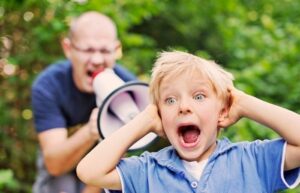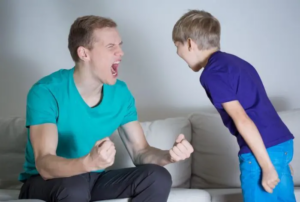Shouting at children, slapping or shaking them to discipline them repeatedly causes changes in their brains that, in adolescence, make it difficult for them to manage emotions and fear.
Actions such as these can alter fear circuits in the brain , according to the results of a study by researchers at the University Hospital Centre Universitaire de Sainte-Justine, University of Montreal, Canada.
The harsher the discipline at home, the more likely it is that children will defy parents with antisocial and aggressive behaviour.
The results, published in Biological Psychology, show that the effects of this kind of repressive parenting can be seen not only in children’s behaviour when they reach adolescence, but also in the way their brains deal with fear. By the time they reach adolescence, they can hardly differentiate between what is frightening and what is not. They also have difficulty identifying their emotions .

Until now, most research has focused on the worst cases of adversity, i.e. children who are abused, neglected or in the care of social services, but this study wanted to delve into the more ‘benign’ adversity, i.e. parents who often shout, slap or shake their children to scold them.
The study found that adolescents who had not had a repressive childhood were able to distinguish a frightening stimulus from a reassuring one, but the other youngsters treated both stimuli in the same way in their brains. Differences were also observed in the communication between the amygdala and the insula, a region of the brain that, among other things, manages visceral sensations such as anxiety.
When communication between these regions is reduced, people suffer from depressive and anxiety disorders , reduced emotional awareness, less awareness of what they are feeling and, if they hear something, they cannot put it into words.
It is easy to lose patience and get carried away, but it is necessary to guard against inappropriate impulsive actions.
For children, the tone of your voice is important, and it expresses much more than your words: this is how you convey your emotions to them.
The way we speak to children, the warmth we convey and the emotional balance changes their brain in one direction or another. Aggressive communication and shouting, on the other hand, create counterproductive stress for them. Tone and modulation are traits of great importance.

What has a greater emotional impact on a baby: the voices or the faces of their parents? The thin voice, rather than just facial expression.
When a baby is just born, their vision is very blurred, and while it is true that they quickly learn to differentiate between faces, it is voices that capture their interest and act as a great emotional channel. What’s more, a newborn baby already knows its mother because it has been accustomed to her voice for months in the womb .
Sometimes, almost without realising it, we end up making a scream, and if it is not a scream it is the tone of our voice that becomes threatening. We do it to get them to listen to us, to stop being disruptive or simply to let off steam after a negative behaviour of the little ones: after the shout comes regret, and we feel bad because we know that shouting does not educate.
The voice is a powerful channel for validating and reinforcing children’s self-esteem: we must speak with respect and affection so that they feel safe, loved and comfortable with us.
Emotion comes through, above all, in our intonation: a calm tone and a tight timbre, as well as a calm modulation accompanied by an articulation that is not too rushed, are gratifying for the child’s brain . That’s all it is: speak clearly, slowly and lovingly.
If they behave badly, it is no obstacle for us to look at them with an angry expression if it is justified: this emotion is part of the human palette of feelings, and there is nothing wrong with children seeing our expression as a reflection of anger, but the expression should not be accompanied by shouting or threats.
Our facial expression informs them of what we hear, but voice and communication educate them.
How do you see it, do you think it is a very idealised or possible approach?
📎 Alcaine, A. [Albert]. (2024, 10 September). Parental repression affects children’s brains. PsicoPop. https://www.psicopop.top/en/parental-repression-affects-childrens-brains/
📖 References:
